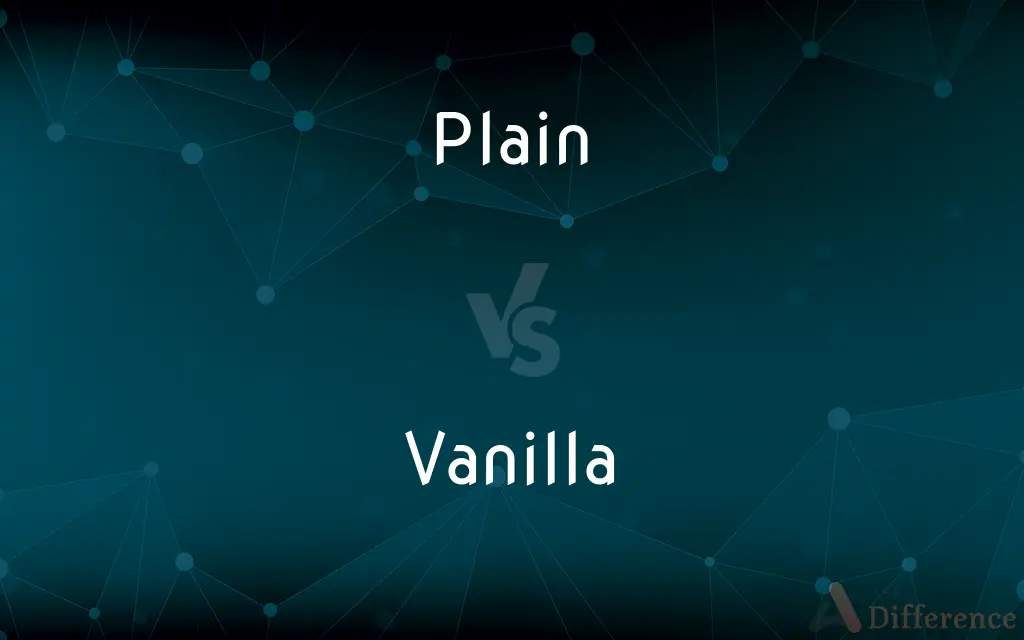Plain vs. Vanilla — What's the Difference?
By Urooj Arif & Maham Liaqat — Published on February 28, 2024
Plain refers to something simple or without any additions, while vanilla, despite being used to describe plainness in popular culture, is a distinct flavor derived from orchids of the genus Vanilla.

Difference Between Plain and Vanilla
Table of Contents
ADVERTISEMENT
Key Differences
Plain is a term often used to describe objects, concepts, or flavors that are basic, unadorned, or unembellished. It signifies the absence of extras or complexities, highlighting simplicity or the original state of something. For example, plain yogurt has no added flavors.
Vanilla, in contrast, is a specific flavor, derived from the vanilla bean, and is one of the most popular flavors in the world, especially in desserts and fragrances. It's associated with a sweet, creamy, and rich taste and aroma.
In popular culture, vanilla is sometimes used metaphorically to denote something ordinary, standard, or lacking in special features. This usage plays on the commonality of vanilla flavor in various products, suggesting that it is the default or basic option.
However, in culinary and botanical contexts, vanilla is anything but plain. It is a highly valued ingredient known for its complex flavor profile and labor-intensive cultivation process. Vanilla beans are the product of orchids that require hand pollination and extensive curing processes to develop their full flavor.
The confusion between "plain" and "vanilla" arises from the colloquial use of vanilla to imply something basic or standard, despite its culinary value and complexity. This contrast highlights the difference between the literal and metaphorical uses of "vanilla" and the straightforward meaning of "plain."
ADVERTISEMENT
Comparison Chart
Definition
Basic, unadorned, or without any additions
A flavor derived from vanilla beans
Usage in Language
Describes simplicity or original state
Often used to represent ordinariness, yet is a distinct and popular flavor
Culinary Context
Indicates absence of added flavors
A specific, sweet, and creamy flavor
Cultural Perception
Considered basic or standard
Commonly perceived as basic but is actually complex and highly valued
Botanical Origin
N/A
Comes from orchids of the genus Vanilla
Compare with Definitions
Plain
Lacking decoration or adornment and simple.
She preferred a plain dress with no frills for the ceremony.
Vanilla
Referring to the aromatic qualities of vanilla beans.
The vanilla scent filled the kitchen as she baked the cake.
Plain
Straightforward or clear in expression.
The instructions were plain and easy to follow.
Vanilla
A flavoring derived from orchids of the genus Vanilla, used in food and beverages.
Vanilla ice cream is my favorite dessert.
Plain
Basic or ordinary in nature.
She opted for a plain lifestyle, avoiding any extravagance.
Vanilla
Involving vanilla as a component in various products.
She preferred vanilla-scented candles for their warm fragrance.
Plain
Food without any added flavor or seasoning.
He ordered a plain bagel with cream cheese.
Vanilla
Highly valued in culinary arts for its complex flavor.
He used real vanilla pods to enhance the sauce.
Plain
Unembellished or unadorned.
The plain walls needed some pictures to add interest.
Vanilla
Used metaphorically to describe something standard or ordinary.
The game's vanilla version lacks the expansions.
Plain
Without elevations or depressions; flat; level; smooth; even.
The crooked shall be made straight, and the rough places plain.
Vanilla
Any of various tropical American vines of the genus Vanilla in the orchid family, especially V. planifolia, widely cultivated for its long narrow seedpods, which yield an aromatic substance used especially as a flavoring.
Plain
Simple in habits or qualities; unsophisticated, not exceptional, ordinary.
They're just plain people like you or me.
Vanilla
(countable) The fruit or bean of the vanilla plant.
Plain
Not mixed with extraneous elements.
Plain water.
Sheer wine.
Not an unmixed blessing.
Vanilla
A distinctive fragrant flavor characteristic of vanilla beans.
Common Curiosities
Why do people use 'vanilla' to mean 'boring' or 'ordinary'?
This usage stems from vanilla's widespread popularity and presence in many products, making it seem like a default or common choice, despite its intrinsic complexity.
Is vanilla flavor actually plain?
No, vanilla is a distinct and complex flavor, although colloquially it's sometimes used to describe something as standard or basic.
What makes vanilla a valuable flavor?
Its labor-intensive cultivation, the complexity of its flavor, and its versatility in culinary uses make vanilla highly valued.
What are some common misconceptions about vanilla?
A common misconception is that vanilla is inherently plain or boring, overlooking its rich flavor and culinary value.
How can the perception of 'vanilla' as boring be changed?
Educating people on the complexity and richness of real vanilla flavor, as well as its culinary importance, can help change this perception.
Can something plain have vanilla flavor?
Yes, a plain product, like yogurt or ice cream, can have vanilla flavor added to it, making it no longer plain in terms of taste.
Is plain yogurt the same as vanilla yogurt?
No, plain yogurt has no added flavors, while vanilla yogurt is flavored with vanilla.
What are the benefits of using real vanilla over artificial vanilla flavoring?
Real vanilla offers a more complex and rich flavor profile, enhancing dishes in a way that artificial flavoring cannot match.
How is vanilla harvested?
Vanilla beans come from orchids that are hand-pollinated; the beans are then harvested, cured, and dried, a process that takes several months.
Can the term 'plain' apply to things other than food?
Yes, 'plain' can describe anything that is simple, unadorned, or basic, from clothing to language.
How does the cost of real vanilla compare to artificial vanilla flavoring?
Real vanilla is significantly more expensive due to its labor-intensive production process, while artificial vanilla flavoring is cheaper and more accessible.
What does it mean when someone describes a person as 'vanilla'?
It typically means the person is perceived as ordinary, conventional, or lacking distinctive characteristics, though this doesn't reflect the true complexity of vanilla.
How do the environmental conditions affect vanilla cultivation?
Vanilla orchids require specific climatic conditions, including temperature, humidity, and shade, making vanilla cultivation challenging and location-specific.
Can the term 'plain' be seen as positive?
Yes, in some contexts, 'plain' can be positive, emphasizing clarity, simplicity, and purity.
Why is vanilla so popular in desserts?
Its sweet, creamy, and rich flavor profile complements a wide range of ingredients, making it a versatile choice for desserts.
Share Your Discovery

Previous Comparison
Indian Ringneck vs. Alexandrine
Next Comparison
Hunger vs. AppetiteAuthor Spotlight
Written by
Urooj ArifUrooj is a skilled content writer at Ask Difference, known for her exceptional ability to simplify complex topics into engaging and informative content. With a passion for research and a flair for clear, concise writing, she consistently delivers articles that resonate with our diverse audience.
Co-written by
Maham Liaqat















































